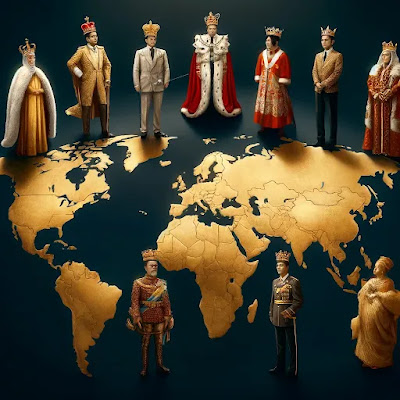Countries That Still Have Kings in 2025
In the 21st century, many people think of kings and queens as part of history books. But surprisingly, monarchs such as kings, queens, emperors, sultans, and emirs still exist and are active in many parts of the world today.
This post introduces countries that still maintain a monarchy in 2025 and explores what roles their monarchs actually play.
1. Constitutional Monarchies (Symbolic Role)
In these countries, the monarch holds no real political power and serves as a symbolic head of state.
🇬🇧 United Kingdom
- Monarch: King Charles III
- Role: Ceremonial head of state, representing national unity and tradition
🇯🇵 Japan
- Monarch: Emperor Naruhito
- Role: The world’s only emperor, strictly symbolic and non-political by constitution
🇸🇪 Sweden, 🇳🇴 Norway, 🇩🇰 Denmark
- These Scandinavian countries retain monarchies with purely ceremonial duties
🇳🇱 Netherlands, 🇧🇪 Belgium, 🇪🇸 Spain
- Monarchies still carry significant cultural and historical weight in these European countries
2. Monarchs with Political Power
Some countries still have monarchs who actively govern and wield real authority.
🇸🇦 Saudi Arabia
- King: Salman bin Abdulaziz
- Role: Both Prime Minister and King, with full executive power
🇶🇦 Qatar, 🇦🇪 United Arab Emirates
- Emir-led governments with considerable ruling authority
- Though some constitutional elements exist, monarchs are highly influential
🇧🇳 Brunei
- Sultan serves as Prime Minister, Finance Minister, and Defense Minister
- A near-absolute monarchy
3. Unique Forms of Monarchy
🇲🇾 Malaysia
- The only rotating monarchy in the world: A king is elected every 5 years among 9 royal families
🇻🇦 Vatican City
- The Pope serves as head of state
- A religious leader with complete sovereign power
🇲🇦 Morocco, 🇯🇴 Jordan
- Mixed monarchies with both symbolic and real political roles
4. Why Do Monarchies Still Exist?
- Serve as unifying national symbols
- Preserve historical continuity and cultural identity
- Provide stability and non-partisan leadership in ceremonial affairs
However, some monarchies are criticized for being undemocratic. Over time, many have evolved into ceremonial institutions with reduced political power.
Conclusion
Monarchs are not just relics of the past. In 2025, they still exist in diverse forms across the globe, playing active roles in politics, culture, and diplomacy. “Countries with kings” are not a thing of history—they are part of today’s living world.
1. Constitutional Monarchies (Symbolic Role)
In these countries, the monarch holds no real political power and serves as a symbolic head of state.
🇬🇧 United Kingdom
- Monarch: King Charles III
- Role: Ceremonial head of state, representing national unity and tradition
🇯🇵 Japan
- Monarch: Emperor Naruhito
- Role: The world’s only emperor, strictly symbolic and non-political by constitution
🇸🇪 Sweden, 🇳🇴 Norway, 🇩🇰 Denmark
- These Scandinavian countries retain monarchies with purely ceremonial duties
🇳🇱 Netherlands, 🇧🇪 Belgium, 🇪🇸 Spain
- Monarchies still carry significant cultural and historical weight in these European countries
2. Monarchs with Political Power
Some countries still have monarchs who actively govern and wield real authority.
🇸🇦 Saudi Arabia
- King: Salman bin Abdulaziz
- Role: Both Prime Minister and King, with full executive power
🇶🇦 Qatar, 🇦🇪 United Arab Emirates
- Emir-led governments with considerable ruling authority
- Though some constitutional elements exist, monarchs are highly influential
🇧🇳 Brunei
- Sultan serves as Prime Minister, Finance Minister, and Defense Minister
- A near-absolute monarchy
3. Unique Forms of Monarchy
🇲🇾 Malaysia
- The only rotating monarchy in the world: A king is elected every 5 years among 9 royal families
🇻🇦 Vatican City
- The Pope serves as head of state
- A religious leader with complete sovereign power
🇲🇦 Morocco, 🇯🇴 Jordan
- Mixed monarchies with both symbolic and real political roles
4. Why Do Monarchies Still Exist?
- Serve as unifying national symbols
- Preserve historical continuity and cultural identity
- Provide stability and non-partisan leadership in ceremonial affairs
However, some monarchies are criticized for being undemocratic. Over time, many have evolved into ceremonial institutions with reduced political power.
Conclusion
Monarchs are not just relics of the past. In 2025, they still exist in diverse forms across the globe, playing active roles in politics, culture, and diplomacy. “Countries with kings” are not a thing of history—they are part of today’s living world.
